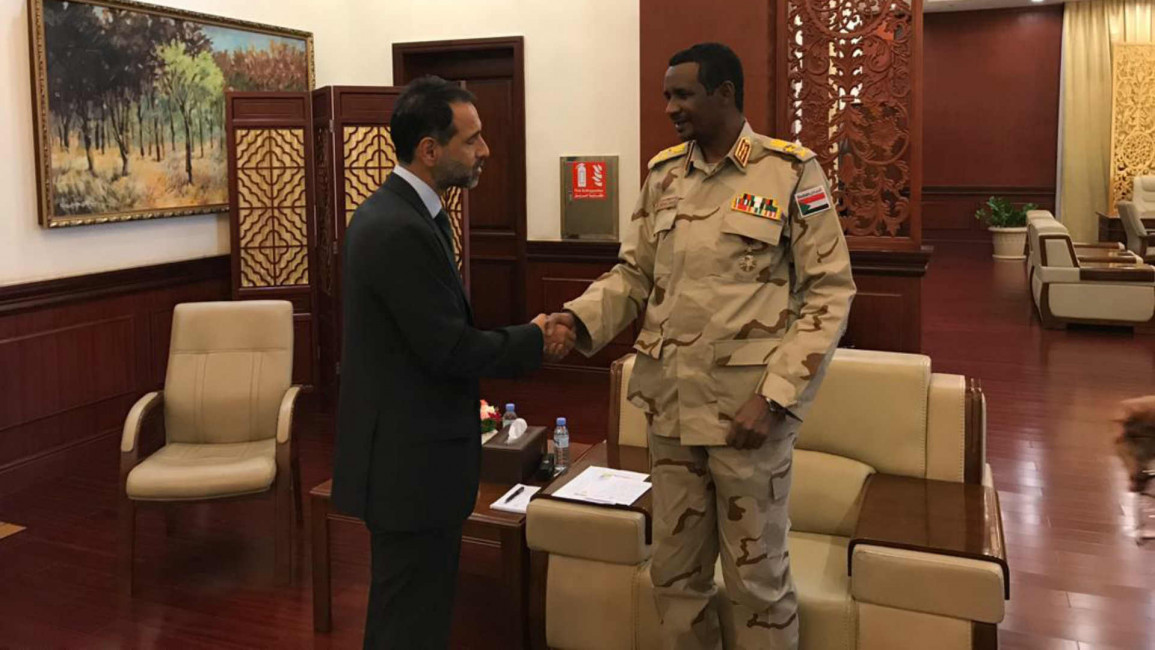British ambassador urges Sudan military to cease attacks on protesters
The UK's ambassador to Khartoum on Sunday met with the deputy leader of Sudan's ruling transitional military council, after generals met other Western diplomats.
After months of widespread popular protests, the military on Thursday overthrew former president Omar al-Bashir - just shy of 30 years in power - and set up a military council it says will rule the country for the next two years.
Deputy leader of the council Mohammad Hamdan Daglo, widely known as Himeidti, also met with Washington's top envoy to Khartoum Steven Koutsis on Sunday.
British ambassador Irfan Siddiq met with Himeidti "not to endorse or confer legitimacy" to the transitional military council, Siddiq said on Twitter, "but to stress steps UK wants to see taken to improve situation in Sudan".
Siddiq added that the key point he had discussed with the deputy leader had been the treatment of thousands of protesters who have been gathered outside the Army General Command in the capital Khartoum for nine consecutive days.
|
|
"Top request was no violence and no attempt to forcibly break the sit-in," said Siddiq.
Himeidti is also the head of Sudan's Rapid Support Forces (RSF), a paramilitary anti-insurgency force with its origins in the Janjaweed militias of the Darfur conflict.
The Sudanese regime is alleged to have recruited, funded and armed the Janjaweed who committed mass rape, murder, war crimes and genocide in West Darfur and other regions, according to the International Criminal Court (ICC).
Read more: 'A portal into tomorrow's Sudan': Inside the sit-in that brought down Sudan's dictator Bashir
The RSF was on Monday accused by protesters present at the sit-in of attempting to break up the sit-in.
The RSF and the army attempted to remove roadblocks erected by protesters to shield the sit-in from attempts to break it up, eyewitnesses said.
"The protesters sat on the ground in front of them peacefully and refused to move the roadblocks," Nadia, a 22-year-old Sudanese architect, told The New Arab.
"So they backed off although they threatened protesters that they will use violence."
Under Himeidti, the RSF has fought against rebel groups in the conflict areas of Darfur, Blue Nile and South Kordofan, but it has also been accused of crimes and human rights violations against civilians in those areas.
The RSF has also been responsible for rounding up and deporting refugees and migrants, most of whom are Somalis, Eritreans and Ethiopians, attempting to cross the desert to reach Europe.
The British ambassador said he had "expressed concerns" about the "historic role of the RSF", saying that allegations of crimes and abuses needed to be addressed by the military council in order to build confidence in it among citizens.
"Transparency" was also necessary to build this confidence, Siddiq said, explaining it was necessary for the military council to clarify the whereabouts of Bashir and "other senior former regime figures".
The ambassador reiterated the UK’s desire for the "swift formation of a civilian transitional government through a transparent, credible and inclusive process", already expressed in a statement by the Troika countries - the United Kingdom, the Unites States and Norway - on Sunday.
|
|
"It is time for the Transitional Military Council and all other parties to enter into an inclusive dialogue to effect a transition to civilian rule," the statement read.
"This must be done credibly and swiftly, with protest leaders, political opposition, civil society organisations, and all relevant elements of society, including women, who are willing to participate."
Siddiq also called for the "immediate reform" of Sudan's National Intelligence and Security Service (NISS).
Transitional military council spokesman Shams al-Din Kabashi pledged on Sunday to reform the NISS.
Despite Siddiq's claim that he did not want to "endorse" or "confer legitimacy" to Himeidti, his announcement was flooded with condemnation by Sudanese Twitter users, who claimed that the council's deputy leader was a "war criminal" responsible for "genocide" and the "rape and murder of hundreds of women in Darfur".
"Definitely, you give him legitimacy by discussing issues concerning all Sudanese people with [a] warlord it's shameful," tweeted one user.
Another replied: "I'm sorry but this is disgusting. Shame on you to shake the hand of a murderer."


![Minnesota Tim Walz is working to court Muslim voters. [Getty]](/sites/default/files/styles/image_684x385/public/2169747529.jpeg?h=a5f2f23a&itok=b63Wif2V)




![Israeli officials are considering exiling Yahya Sinwar to Sudan as part of a deal to end the war [Getty]](/sites/default/files/styles/image_212x120/public/1251837582.jpeg?h=127ba027&itok=UTeIubIr)
![Debris near Rafic Hariri International Airport [Getty]](/sites/default/files/styles/image_330x185/public/2176162423.jpeg?h=a5f2f23a&itok=MCSK9mkM)
![An Israeli air strike on Jabalia killed teenage journalist Hassan Hamad [Screengrab/X]](/sites/default/files/styles/image_330x185/public/2024-10/hassan%20hamad1.jpg?h=c12e0b96&itok=Rd_dyCVp)